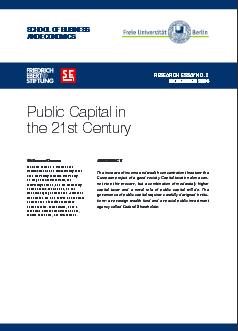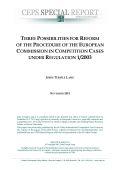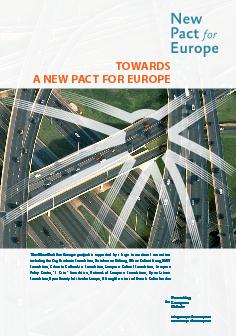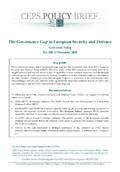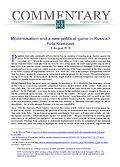Costa-i-Font, J. & Zigante, V. (2014) “Why the views of middle class citizens help explain increased choice in European healthcare systems“, LSE EUROPP, 21 Νοεμβρίου. Several countries across Europe have attempted to reform their health systems by allowing patients more choice over their healthcare provider. The typical rationale for this strategy is that by creating competition between providers, there will be an increased incentive to improve the efficiency and …Read More
Public Capital in the 21st Century
Corneo, G. (2014) “Public Capital in the 21st Century“, Friedrich Ebert Stiftung, Freie Uni Berlin & Social Europe Journal, Research Essay No.2, Νοέμβριος. The increase of income and wealth concentration threatens the European project of a good society. Capital taxation alone cannot stop this process, but a combination of moderately higher capital taxes and a novel role of public capital will do. The governance of public capital requires carefully …Read More
Europe’s goal should not be a United States of Europe, but a better united Europe of states
Glendinning, S. (2014) “Europe’s goal should not be a United States of Europe, but a better united Europe of states“, LSE EUROPP, 20 Νοεμβρίου. Is a European ‘superstate’ desirable and, if so, could it ever be created? Simon Glendinning writes on philosophical approaches to this question, drawing on the work of philosophers such as Hegel, Kant, Marx and Derrida. Taking inspiration from Kant, he argues that rather than aiming …Read More
Does EU regulation hinder or stimulate innovation?
Pelkmans, J. & Renda, A. (2014) “Does EU regulation hinder or stimulate innovation?“, Regulatory Policy, CEPS Special Reports, 19 Νοεμβρίου. One frequently hears the question posed in the title to this report, but there is little systematic analytical literature on the issue. Fragmented evidence or anecdotes dominate debates among EU regulatory decision-makers and in European business, insofar as there is a genuine debate at all. This CEPS Special Report …Read More
Erosion Or Exhaustion Of Democracy? The Challenge For Social Europe
Blühdorn, I. (2014) “Erosion Or Exhaustion Of Democracy? The Challenge For Social Europe“, Social Europe Journal, 18 Νοεμβρίου. Social Europe is caught between a rock and a hard place. It is supposed to restore confidence in democracy – which since the bailout of the failing banks and the ensuing politics of austerity can hardly be regarded as a plausible promise anymore and which, anyway, at EU-level is known primarily …Read More
Rethinking the Attractiveness of EU Labour Immigration Policies: Comparative perspectives on the EU, the US, Canada and beyond
Carrera, S., Guild, E. & Eisele, K. (2014) “Rethinking the Attractiveness of EU Labour Immigration Policies: Comparative perspectives on the EU, the US, Canada and beyond“, Justice and Home Affairs, CEPS Paperbacks, 13 Νοεμβρίου. Is Europe’s immigration policy attractive? One of the priorities driving current EU debates on labour immigration policies is the perceived need to boost Europe’s attractiveness vis-á-vis ‘talented’ and ‘highly skilled’ immigrants. The EU sees itself …Read More
The 2014 EU-wide bank stress test lacks credibility
Goldstein, M. (2014) “The 2014 EU-wide bank stress test lacks credibility“, VoxEU Organisation, 18 Νοεμβρίου. Results from last month’s EU-wide stress test are reassuring, especially for countries at Europe’s core. This column warns against a rosy interpretation. The test relies on risk-weighted measures of bank capital ratios that have been shown to be less predictive of bank failure than unweighted leverage ratios – a metric already adopted by the …Read More
New Pact for Europe: Second Report – Towards a New Pact for Europe
Emmanouilidis, Α. J. & Davis, J. (Ed.) New Pact for Europe: Second Report – Towards a New Pact for Europe, A publication of the King Baudouin Foundation, the Bertelsmann Stiftung and the European Policy Centre (EPC), Οκτώβριος 2014. NEW PACT FOR EUROPE – PROJECT DESCRIPTION In 2012, a consortium of 11 European foundations initiated by the King Baudouin Foundation and Bertelsmann Stiftung, and supported by the European Policy …Read More
Was the ECB’s Comprehensive Assessment up to standard?
De Groen, W. P. (2014) “Was the ECB’s Comprehensive Assessment up to standard?“, Centre for European Policy Studies (CEPS), Policy Brief Νο. 325, 10 Νοεμβρίου. The Comprehensive Assessment conducted by the European Central Bank (ECB) represents a considerable step forward in enhancing transparency in euro-area banks’ balance sheets. The most notable progress since the previous European stress test has been the harmonisation of the definition of non-performing loans and …Read More
The case of the disappearing Fiscal Compact
Gros, D. & Alcidi, C. (2014) “The case of the disappearing Fiscal Compact“, Economic Policy – Centre for European Policy Studies (EPC) Commentary, 05 Νοεμβρίου. Following the Commission’s autumn forecast showing that only five euro-area countries exhibit a fiscal balance better than the 0.5% of GDP deficit allowed by the Fiscal Compact, Daniel Gros and Cinzia Alcidi attempt to explain in this new Commentary why there is precious little …Read More




